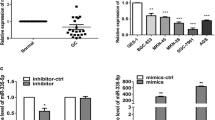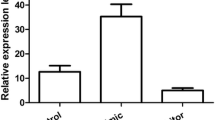Abstract
We aimed to study the post-translational regulation of CD151 by the microRNA miR-152. CD151 is highly expressed in gastric cancer (GC) and has been shown to accelerate GC by enhancing invasion and metastasis; however, its regulation is still unclear. Our results showed decreased expression of miR-152 in GC tissue samples and cell lines. In addition, miR-152 complementation significantly inhibits both the proliferation and motility of GC cells. CD151 was found to be a target of miR-152, and overexpression of CD151 attenuated the suppressive effect of miR-152. Our findings highlight an essential role of miR-152 in the regulation of proliferation and motility of GC cells and suggest a potential application of miR-152 in GC treatment.





Similar content being viewed by others
References
Jemal A, Bray F, Center MM, Ferlay J, Ward E, Forman D. Global cancer statistics. CA Cancer J Clin. 2011;61:69–90.
Wang YY, Ye ZY, Zhao ZS, Tao HQ, Li SG. Systems biology approach to identification of biomarkers for metastatic progression in gastric cancer. J Cancer Res Clin Oncol. 2010;136:135–41.
Otani K, Li X, Arakawa T, Chan FK, Yu J. Epigenetic-mediated tumor suppressor genes as diagnostic or prognostic biomarkers in gastric cancer. Expert Rev Mol Diagn. 2013;13:445–55.
Zoller M. Gastrointestinal tumors: metastasis and tetraspanins. Z Gastroenterol. 2006;44:573–86.
Pols MS, Klumperman J. Trafficking and function of the tetraspanin cd63. Exp Cell Res. 2009;315:1584–92.
Sadej R, Romanska H, Kavanagh D, Baldwin G, Takahashi T, Kalia N, et al. Tetraspanin cd151 regulates transforming growth factor beta signaling: implication in tumor metastasis. Cancer Res. 2010;70:6059–70.
Kwon MJ, Seo J, Kim YJ, Choi JY, Kim TE, Lee DH, et al. Prognostic significance of cd151 overexpression in non-small cell lung cancer. Lung Cancer. 2013;81:109–16.
Yang YM, Zhang ZW, Liu QM, Sun YF, Yu JR, Xu WX. Overexpression of cd151 predicts prognosis in patients with resected gastric cancer. PLoS One. 2013;8:e58990.
Zhang N, Wei X, Xu L. Mir-150 promotes the proliferation of lung cancer cells by targeting p53. FEBS Lett. 2013;587:2346.
Ayaz L, Gorur A, Yaroglu HY, Ozcan C, Tamer L. Differential expression of micrornas in plasma of patients with laryngeal squamous cell carcinoma: potential early-detection markers for laryngeal squamous cell carcinoma. J Cancer Res Clin Oncol. 2013;139:1499.
Wach S, Nolte E, Theil A, Stohr C, Rau TT, Hartmann A, et al. Microrna profiles classify papillary renal cell carcinoma subtypes. Br J Cancer. 2013;109:714.
Chen J, Yao D, Li Y, Chen H, He C, Ding N, et al. Serum microrna expression levels can predict lymph node metastasis in patients with early-stage cervical squamous cell carcinoma. Int J Mol Med. 2013;32:557.
Chang L, Guo F, Wang Y, Lv Y, Huo B, Wang L, et al. Microrna-200c regulates the sensitivity of chemotherapy of gastric cancer sgc7901/ddp cells by directly targeting rhoe. Pathol Oncol Res. 2013;20:93.
Jiang B, Li Z, Zhang W, Wang H, Zhi X, Feng J, et al. Mir-874 inhibits cell proliferation, migration and invasion through targeting aquaporin-3 in gastric cancer. J Gastroenterol. 2013;49:1011.
Chen Y, Song Y, Wang Z, Yue Z, Xu H, Xing C, et al. Altered expression of mir-148a and mir-152 in gastrointestinal cancers and its clinical significance. J Gastrointest Surg. 2010;14:1170–9.
Huang J, Wang Y, Guo Y, Sun S. Down-regulated microrna-152 induces aberrant DNA methylation in hepatitis b virus-related hepatocellular carcinoma by targeting DNA methyltransferase 1. Hepatology. 2010;52:60–70.
Zhu C, Li J, Ding Q, Cheng G, Zhou H, Tao L, et al. Mir-152 controls migration and invasive potential by targeting TGFalpha in prostate cancer cell lines. Prostate. 2013;73:1082–9.
Xiang Y, Ma N, Wang D, Zhang Y, Zhou J, Wu G, et al. Mir-152 and mir-185 co-contribute to ovarian cancer cells cisplatin sensitivity by targeting dnmt1 directly: a novel epigenetic therapy independent of decitabine. Oncogene. 2013;33:378.
Hemler ME. Tetraspanin functions and associated microdomains. Nat Rev Mol Cell Biol. 2005;6:801–11.
Han ZB, Yang Z, Chi Y, Zhang L, Wang Y, Ji Y, et al. Microrna-124 suppresses breast cancer cell growth and motility by targeting cd151. Cell Physiol Biochem. 2013;31:823–32.
Fei Y, Wang J, Liu W, Zuo H, Qin J, Wang D, et al. Cd151 promotes cancer cell metastasis via integrins alpha3beta1 and alpha6beta1 in vitro. Mol Med Rep. 2012;6:1226–30.
Rubinstein E. The complexity of tetraspanins. Biochem Soc Trans. 2011;39:501–5.
Conflicts of interest
None
Author information
Authors and Affiliations
Corresponding author
Rights and permissions
About this article
Cite this article
Zhai, R., Kan, X., Wang, B. et al. miR-152 suppresses gastric cancer cell proliferation and motility by targeting CD151. Tumor Biol. 35, 11367–11373 (2014). https://doi.org/10.1007/s13277-014-2471-2
Received:
Accepted:
Published:
Issue Date:
DOI: https://doi.org/10.1007/s13277-014-2471-2




